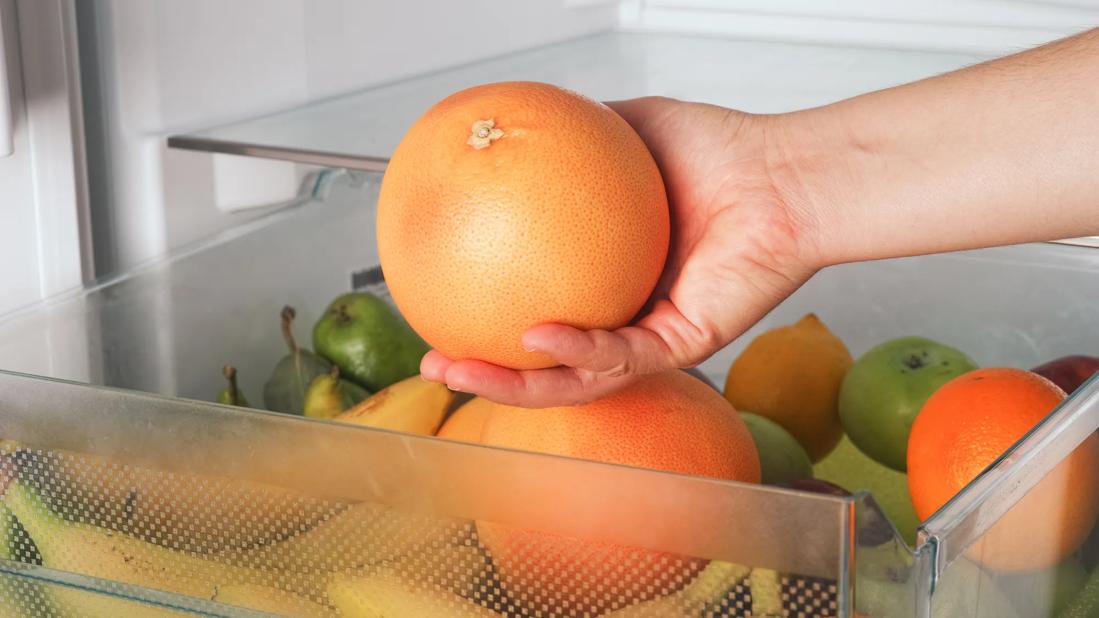Grapefruit contains natural chemical compounds that can interfere with certain medications when it’s consumed in large amounts

Image content: This image is available to view online.
View image online (https://assets.clevelandclinic.org/transform/434e2e54-4d9f-4fc8-b192-33160587db9a/grapefruit-1283045796)
Hand taking a grapefruit out of the fruit drawer in a fridge
If you take a statin to manage your cholesterol, can you eat grapefruit or drink grapefruit juice? It’s a question that comes up all the time, says preventive cardiology specialist Stanley Hazen, MD, PhD.
Advertisement
Cleveland Clinic is a non-profit academic medical center. Advertising on our site helps support our mission. We do not endorse non-Cleveland Clinic products or services. Policy
The reason? Well, let’s just say that large amounts of grapefruit and certain statins don’t always mix well — a reality that earns the citrus fruit an appearance on a few medication warning labels.
But that doesn’t mean that everyone on a statin needs to totally swear off grapefruit, as Dr. Hazen explains.
Video content: This video is available to watch online.
View video online (https://cdnapisec.kaltura.com/p/2207941/sp/220794100/playManifest/entryId/1_n7fs1vjb/flavorId/1_5f3sgelj/format/url/protocol/https/a.mp4)
Learn how grapefruit affects the way certain statins are metabolized from cardiologist Tamanna Singh, MD.
Grapefruit contains natural chemical compounds that can interfere with your body’s ability to break down some (but not all) statins. This increases the amount of medication entering your system.
Basically, it can seem as if you have increased your statin dose, although minimally, says Dr. Hazen.
Basically, it has an overdosing effect, which can cause issues, he adds.
Side effects from a grapefruit-statin interaction are typically mild, such as an increase in muscle and joint pain. Severe side effects are extremely rare but can include muscle fiber breakdown and kidney injury.
Certain statins are more likely to interact with grapefruit and increase medication levels in the bloodstream, says Dr. Hazen. The list includes some of the most prescribed drugs used to treat high cholesterol, like:
Advertisement
As might be expected, higher doses of these medications increase the amount entering your bloodstream and the risk of potential side effects.
Dr. Hazen says grapefruit appears to have little to no interaction with statins such as:
The fine print in safety information that comes with certain statins typically warns of potential complications if you consume large amounts of grapefruit juice. But what exactly does that mean?
Medication labels define this “excessive consumption” as 1.2 liters of grapefruit juice per day. That’s the equivalent of five — yes, five! — 8-ounce glasses of 100% grapefruit juice.
Dr. Hazen says he recommends a measured approach for grapefruit-loving people on a statin. (This matches the guidance offered in a widely cited 2016 study.)
That could mean eating half a grapefruit, for instance, or downing a single glass of juice.
“A more reasonable level of grapefruit and grapefruit juice consumption would result in far less, if any, effect on statins,” he adds.
Grapefruit boasts an impressive nutritional resume and is even considered a heart-healthy food given its high fiber content. That’s a desirable perk if you’re concerned about your cholesterol.
Still, as there’s a known interaction between grapefruit and certain statins, it’s best to talk with your healthcare provider about eating grapefruit or drinking grapefruit juice if you’ve been prescribed a statin.
“I personally tell my patients who’ve had no issues with taking a statin, ‘Go ahead and eat the grapefruit, but in moderation,’” shares Dr. Hazen. “Better they eat a nutritious and low-calorie fruit — and if we find symptoms of statin intolerance, we can cross that bridge, if need be.”
Advertisement

Sign up for our Health Essentials emails for expert guidance on nutrition, fitness, sleep, skin care and more.
Learn more about our editorial process.
Advertisement
High cholesterol can be genetic, but testing and treatment can lower your heart disease risk
Limiting saturated fat, upping your fiber intake and moving around more can help reduce your ‘bad’ cholesterol
There isn’t enough research to recommend the supplement as a solution for lowering LDL levels
You may notice a decrease in your LDL ‘bad’ cholesterol in about four weeks
In the world of cholesterol, HDL particles are ‘good’ and LDL particles are ‘bad’ for your heart health
Medications known as statins can lower cholesterol levels to minimize the risk of blocked arteries
Fatty fish, flaxseed, extra virgin olive oil and nuts may help raise your HDL number
Up to 30% of people who take the cholesterol-lowering medication feel aches and soreness
Although it could be used as a moisturizer, this new trend is not recommended
Communicating clear limits helps protect your time, energy and emotional well-being
High cholesterol can be genetic, but testing and treatment can lower your heart disease risk